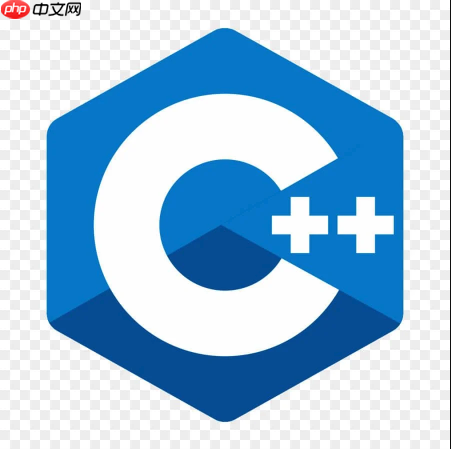使用函数模板实现通用比较函数是C++中最有效且类型安全的方式,通过template<typename T>定义模板,利用<运算符比较两个值并返回-1、0或1,编译器在编译时根据传入类型自动生成对应函数实例,适用于内置类型和重载了比较运算符的自定义类型,兼具代码复用性、类型安全性和高性能。

在C++中,实现一个通用比较函数最有效且类型安全的方式是利用函数模板。通过定义一个接受泛型类型参数的函数,编译器可以在编译时根据传入的实际数据类型自动生成特定版本的比较逻辑,从而实现一套代码适用于多种数据类型,极大减少了重复劳动并提升了代码的灵活性和可维护性。
实现一个泛型的比较函数,其核心在于使用
template <typename T>
T
一个基本的通用比较函数通常会返回一个整数,表示两个值之间的相对顺序:
-1
1
0
下面是一个实现示例:
立即学习“C++免费学习笔记(深入)”;
#include <string>
#include <iostream>
// 通用比较函数模板
template <typename T>
int compare(const T& a, const T& b) {
if (a < b) {
return -1; // a 小于 b
} else if (b < a) { // 这里用 b < a 而不是 a > b,是更通用的做法,避免某些类型只重载了 <
return 1; // a 大于 b
} else {
return 0; // a 等于 b
}
}
// 实际使用示例
int main() {
// 比较整数
std::cout << "compare(5, 10): " << compare(5, 10) << std::endl; // 输出: -1
std::cout << "compare(10, 5): " << compare(10, 5) << std::endl; // 输出: 1
std::cout << "compare(7, 7): " << compare(7, 7) << std::endl; // 输出: 0
// 比较浮点数
std::cout << "compare(3.14, 2.71): " << compare(3.14, 2.71) << std::endl; // 输出: 1
// 比较字符串
std::string s1 = "apple";
std::string s2 = "banana";
std::cout << "compare(\"apple\", \"banana\"): " << compare(s1, s2) << std::endl; // 输出: -1
std::cout << "compare(\"zebra\", \"apple\"): " << compare("zebra", "apple") << std::endl; // 输出: 1
// 比较字符
std::cout << "compare('a', 'z'): " << compare('a', 'z') << std::endl; // 输出: -1
return 0;
}这个
compare
int
double
char
std::string
<
compare(5, 10)
T
int
compare<int>
std::string
compare<std::string>
在我看来,模板不仅仅是C++的一个特性,它简直是处理泛型编程的基石,尤其在通用比较函数这种场景下,它的优势是其他方法难以比拟的。
首先,代码复用性达到了极致。想想看,如果不用模板,你需要为
int
compareInt
double
compareDouble
std::string
compareString
其次,类型安全是其显著优点。模板在编译时进行类型检查。这意味着如果你尝试比较两个不支持
<
void*
再者,性能表现优秀。模板函数在编译时被实例化,这和直接手写特定类型的函数几乎没有性能差异。编译器甚至可以对模板函数进行内联优化,进一步消除函数调用的开销。这与那些通过虚函数或函数指针实现多态的运行时泛型方法不同,后者的性能开销通常会稍大一些。模板实现了“零开销抽象”,这在追求极致性能的C++项目中至关重要。
最后,它支持了C++的现代编程范式。无论是标准库中的
std::sort
std::min
std::max
当我们的数据不再是简单的
int
std::string
1. 自定义类型:重载比较运算符
对于自定义类型,最“C++化”且推荐的做法是重载其内部的比较运算符(
operator<
operator>
operator==
compare
比如,我们有一个
Student
#include <string>
#include <iostream>
#include <vector>
#include <algorithm> // for std::sort
struct Student {
std::string name;
int age;
double score;
// 重载小于运算符
bool operator<(const Student& other) const {
if (age != other.age) {
return age < other.age; // 年龄不同,按年龄升序
}
return name < other.name; // 年龄相同,按姓名升序
}
// 重载大于运算符(通常利用小于运算符实现)
bool operator>(const Student& other) const {
return other < *this;
}
// 重载等于运算符(如果需要)
bool operator==(const Student& other) const {
return name == other.name && age == other.age && score == other.score;
}
};
// 我们的通用比较函数(无需修改)
template <typename T>
int compare(const T& a, const T& b) {
if (a < b) {
return -1;
} else if (b <以上就是C++如何使用模板实现通用比较函数的详细内容,更多请关注php中文网其它相关文章!

每个人都需要一台速度更快、更稳定的 PC。随着时间的推移,垃圾文件、旧注册表数据和不必要的后台进程会占用资源并降低性能。幸运的是,许多工具可以让 Windows 保持平稳运行。




Copyright 2014-2025 https://www.php.cn/ All Rights Reserved | php.cn | 湘ICP备2023035733号